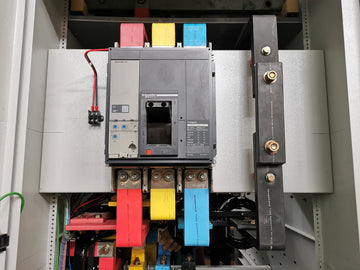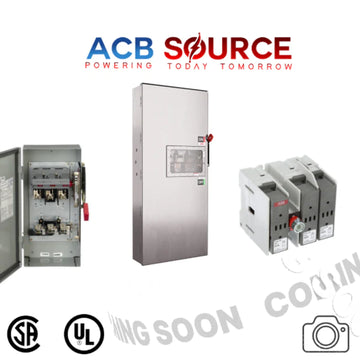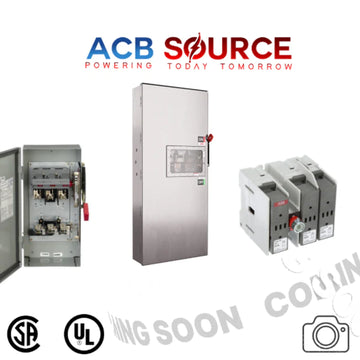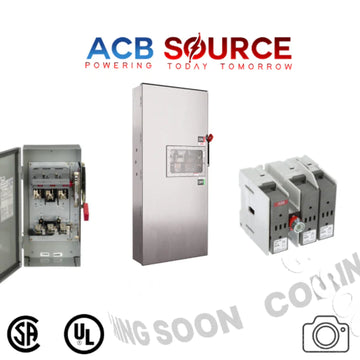Industrial electrical circuit breakers are crucial components in power distribution systems, providing protection against overloads, short circuits, and other electrical faults. When it comes to acquiring these essential devices, businesses often face the decision between new and used circuit breakers. In this comprehensive guide, we explore the factors to consider when making informed choices between new and used industrial electrical circuit breakers.
The Role of Industrial Electrical Circuit Breakers
Before delving into the considerations of choosing between new and used circuit breakers, let's understand the pivotal role these devices play in industrial settings.
- Overcurrent Protection:
Industrial electrical circuit breakers serve as a first line of defense against overcurrents. They monitor the flow of electrical current and interrupt the circuit if it exceeds safe levels, preventing damage to equipment and ensuring the safety of the electrical system.
- Short Circuit Protection:
In the event of a short circuit, circuit breakers respond swiftly by interrupting the circuit. This rapid response helps minimize the potential for electrical fires and protects valuable equipment from damage.
- Isolation of Faulty Circuits:
Circuit breakers allow for the selective isolation of faulty circuits, making it easier for maintenance personnel to identify and address issues without affecting the entire electrical system.
- Reliable Power Distribution:
By preventing electrical overloads and faults, circuit breakers contribute to the reliable distribution of power in industrial facilities. This reliability is essential for maintaining continuous operations and preventing costly downtime.
Considerations for New Industrial Electrical Circuit Breakers
- Reliability and Performance:
New circuit breakers are designed with the latest technologies, ensuring optimal performance and reliability. They often come with advanced features, such as digital monitoring and communication capabilities, providing enhanced control and visibility into the electrical system.
- Manufacturer's Warranty:
Purchasing new circuit breakers typically comes with the added benefit of a manufacturer's warranty. This warranty offers protection against defects in materials and workmanship, providing peace of mind and cost savings in the event of unforeseen issues.
- Compliance with Standards:
New circuit breakers are designed and tested to meet the latest industry standards and regulations. This compliance ensures that the equipment aligns with safety and performance requirements, contributing to a safer and more efficient industrial environment.
- Long-Term Investment:
Investing in new circuit breakers is a long-term commitment. While the initial cost may be higher compared to used options, the extended lifespan and reliability of new equipment often result in a more cost-effective solution over the life of the industrial facility.
- Availability of Spare Parts:
New circuit breakers benefit from ongoing manufacturer support, ensuring the availability of spare parts and support services. This availability simplifies maintenance and repairs, minimizing downtime in the event of a component failure.
- Technology Advancements:
New circuit breakers often incorporate the latest technological advancements, such as smart features and remote monitoring capabilities. These innovations provide opportunities for improved energy management, predictive maintenance, and enhanced overall system efficiency.
Considerations for Used Industrial Electrical Circuit Breakers
- Cost Savings:
One of the primary advantages of opting for used circuit breakers is the potential for significant cost savings. Used equipment is generally more budget-friendly, making it an attractive option for businesses looking to reduce upfront expenses.
- Availability:
Used circuit breakers are readily available in the market, and businesses can often find specific models that may no longer be in production as new units. This availability can be advantageous when trying to match existing equipment in an industrial facility.
- Short-Term Solutions:
Used circuit breakers can serve as viable short-term solutions, especially in situations where immediate replacement or expansion is required. This can be beneficial for businesses facing tight deadlines or temporary capacity needs.
- Inspection and Testing:
Before purchasing used circuit breakers, thorough inspection and testing are essential. Reputable sellers will provide detailed information about the condition of the equipment, including any refurbishments or modifications. Conducting additional testing upon receipt can further ensure the reliability of used circuit breakers.
- Environmental Considerations:
Opting for used circuit breakers aligns with environmental sustainability goals by extending the lifespan of electrical equipment. Reusing components reduces the demand for new manufacturing and minimizes the environmental impact associated with the production of new devices.
- Compatibility with Existing Systems:
Used circuit breakers can be suitable for businesses seeking replacements or additions that match the specifications of existing systems. Compatibility is crucial to maintain uniformity in the electrical infrastructure and facilitate seamless integration.
Making Informed Choices: Factors to Consider
- Application Requirements:
Consider the specific requirements of the industrial application. For critical systems where reliability is paramount, new circuit breakers with advanced features may be the preferred choice. In less critical areas, cost-effective used circuit breakers may suffice.
- Budget Constraints:
Evaluate the budget constraints of the project. While new circuit breakers offer long-term benefits, businesses with limited budgets may find cost savings in opting for used equipment.
- System Longevity:
Assess the expected lifespan of the electrical system and the role of circuit breakers within it. For long-term investments, new circuit breakers may provide extended reliability and performance.
- Maintenance and Support:
Consider the availability of maintenance support and spare parts. New circuit breakers often come with comprehensive support, while used equipment may rely on aftermarket solutions.
- Environmental Considerations:
Align the decision with environmental sustainability goals. Businesses committed to reducing their environmental footprint may find value in choosing used circuit breakers to extend the lifecycle of electrical equipment.
- Future Expansion:
Evaluate the potential for future expansion or modifications. New circuit breakers may offer scalability and compatibility with evolving technologies, providing flexibility for future upgrades.







